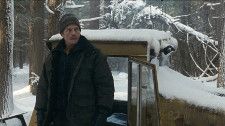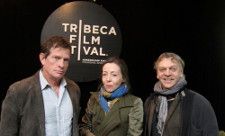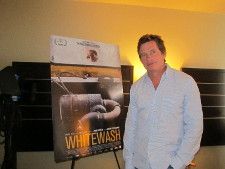
On a very snowy night, Whitewash, directed by Emanuel Hoss-Desmarais, blows us into the icy world of a man at a crossroads. Bruce, whose life changes forever after encountering Paul, whose personality couldn't be more different from his but whose situation is no less urgent, has to confront the basics of survival - food, warmth, shelter. Bruce is played with great strength and impeccable timing by Thomas Haden Church. We met for a chat about muscles, John Huston and Richard Harris, glass eyes and strong beer. It is April in New York, and although the allergy season got to both of us a little bit, very few things get Thomas Haden Church down.
Anne-Katrin Titze: I was very impressed with the physicality of what you were doing in Whitewash.
Thomas Haden Church: Thank you. It was very gruelling.
AKT: Simply the list of things you are carrying through the snow in the storms.
THC: It was intense. It's been over a year now, I've already gone and done another movie. Because I'm a rancher in Texas, I have a very physical life. The work I do with animals - cattle - plus I work out a lot, I ride my bike ten miles, and I have two young daughters, just to maintain a certain amount of fitness after 50.
AKT: You must have used some other muscles trekking through the snow, though, didn't you?
THC: That's the thing. What I quickly realised I had neglected was my legs. All that tromping through the forest and at any moment you could go into a drift and it comes up to your chest and you have to climb out. And then on that frozen lake, when we would shoot close to the edge where it would start to melt it was real slushy. And if I had any gear at all, carrying gear out, it was pretty intense. Now it's been a year and it sort of fades, and even now when I watch the movie it's like, oh man, that was gruelling. The conditions, you know, it was always cold, always snowing, always wet. And if it wasn't windy enough, they had these 8 foot fans on car engines, and then the special effects people would throw ice and frozen corn starch - you can really see it on camera. And they would throw boxes of that shit and then they would crank it up and these engines would be blowing like 60, 70 miles an hour.

AKT: The snow storm at the very beginning when you hit the guy was really intense. Was that cornstarch?
THC: That was real. They did have the fans going that night, but these big wide shots when Marc Labrèche is walking, that was a real storm that came blowing in. We were lucky. I don't know how well you know that area in Montreal and Northern Quebec, it was just blizzard after blizzard after blizzard. They timed the shoot for that. We filmed February and March last year [2012], and they knew, towards the end, the stuff was melting, and we filmed the other scenes.
AKT: Which is a great relief for the audience too.
He went on talking about another blizzard scene that would give away too much of the plot.
THC: For some scenes it was like 80 degrees Fahrenheit, but I still had to wear that big snowsuit. I was dying inside that thing! They had to keep drying my face off. When I finally got out of that ski suit, I had undergarments that were soaking wet.
AKT: The choices for the garments were really interesting.
THC: The costume designer is the director's sister, she is terrifically talented.
AKT: Mentally, were there any people you were thinking about, who could be this man Bruce?
THC: There's a movie, John Huston directed it. It's called Man In The Wilderness (1971), and it came out around 1970. It's about a party of frontiersmen and they are traversing North America, they are all trappers. And they stop and this guy goes into the woods and is attacked by a bear, mauled horribly. They kill the bear and say to him "we're going to have to leave you here." They were afraid they would get infected and that he would attract other animals, wolves, bears, whatever. The actor [who plays the man they leave behind] is Richard Harris. I knew the movie and was always a big fan of Richard Harris, I saw it as a child. I remembered how desperate the circumstances were and him trying to survive in the wilderness with nothing. Obviously this character Bruce [in Whitewash], he has a little bit more at his disposal. He finds that little village.
AKT: You have a very funny scene there in the diner where you put the burgers in your coat. Did you come up with that yourself?
THC: Yes. We were trying to figure it out. The woman in the diner brought out styrofoam containers, and we went no, no, no. I said to [the director] what if I just put it in my pocket? And we turned it into a thing. It became a bit, it had two beats instead of just one.
AKT: The food is quite a theme in the movie. At one point you carry bags of cheese puffs and a wrench as survival items.
THC: We dig up the most sensational things, because he is so desperate. He gets like eight bags. Manny was asking me if I thought the character would get a variety of things and I said, I don't think so. He would go - what tastes the best? He gets hamburgers, coffee, a piece of pie and a beer.
AKT: And he eats the pie first with the beer.
THC: Which turned out to be a horrifying experience the next day. Eating that much sugar pie! It was horrible.
AKT: Did you eat the cheese puffs too?
THC: Oh, yeah, yeah. Like the beer it wasn't enough. On the label it says 'High Octane Beer'. He doesn't just get normal beer, it's like 10 or 12% alcohol, two or three times stronger than normal beer. That's the beer he gets - the strongest beer and the worst food.
AKT: And then he grills meat and potatoes on the hood of the tractor.
THC: I love that scene. The story has come full circle. He very delicately takes care of the machine again. he knows that his life has come full circle and this is where he is supposed to be, given everything that happened to him. He realises his place in the universe. We talked for a long time about ending the movie there. We debated this all through editing. How should the movie end? Should it be with Bruce happy and content or do we go the next step?
AKT: The movie contains the statement: "They say every guilty person is his own hangman."
THC: The next line is: "But don't people say tomorrow is a better day?" And then I say : "It's damn cold out here." That's the brutal truth of where he is.
AKT: It becomes much larger than just this character. So many people are dissatisfied with their lives in the city who have a romanticised idea of living in the wilderness. Walden without the real circumstances.
THC: Right. Into The Wild. I did a movie [Killer Joe, directed by William Friedkin] with Emile Hirsch that came out last year.
AKT: What is the movie you just finished that you mentioned earlier?
THC: Lucky Them [directed by Megan Griffiths], a movie I just finished with Toni Colette and Oliver Platt and this wonderful New York actress Nina Arianda, and Johnny Depp did a small part. It's a romantic comedy.

AKT: Romantic comedies should have people whose wives make glass eyes for dolls, don't you think? [I am referring to the dead wife's job in Whitewash].
THC: Yeah. Right? I really pushed him for that. In the original script, his wife's disappearance is a mystery, but you know from his demeanor that she's probably not alive.
AKT: Did you improvise dialogue?
THC: Yes. Not a lot, but I always do. Even with Marc. One of my favorite scenes in the movie is when I catch him stealing. I said, just keep saying the same things to me, while I was watching him. It's not something that we planned at all. The way it was originally scripted was that we get into this big fight. I said, it's got to be much more violent and it's got to be quick, and it turns into this very quiet negotiation.
AKT: There are a lot of surprises in Whitewash. Nothing really is predictable, anything could happen at any time in this snowy world.
I met Thomas again at the Tribeca Press Lounge a few days later and he introduced me to his costar Marc Labrèche, who as Paul, faced some different challenges in Whitewash.
Anne-Katrin Titze: How would you describe the costumes you are sporting in Whitewash?
Marc Labrèche: Strongly hideous. it was very funny because we used to go with the costume designer [Myriam Hoss-Desmarais, Emanuel's sister] into horrible stores with horrible clothes. I was trying on these strongly hideous clothes, and she was looking at me very seriously and said "yeah". And I said "It's ugly." And she said "I know. I love that." She was really involved in the process. I found that very funny.
AKT: Did you see [Lee Daniel's] The Paperboy? When I talked to Nicole Kidman about her costumes in that film, she sounded exactly like you. I called the result "Swamp Barbie." You are the Northern male version of Swamp Barbie.
ML: Yes I am. It's horrible.
AKT: You have some wild scenes in the movie, stealing dolls' eyeballs, for example. Was some of this scene improvised?
ML: The lines were almost written as they were shot but what was really fun and great with Manu [the director] is the tempo. People always think you have to have rhythm, you have to be faster and I will improve it in the editing. But Manu was like no, just take your time. If you don't want to talk for two minutes, don't talk. Just let things come and flow. So in that scene we were just looking at each other for minutes and minutes.
AKT: The effect is menacing.
ML: Yes, he [Thomas Haden Church as Bruce] was looking at me. He has this cowboy look. I was just trying to escape his look, because he was so mad at me. It was really playing like children, the first time in a long time.
AKT: Of course your dance scene is another…
ML: Hideously strong moment? It was really disturbing and ill-at-ease. There were all these young girls, 14 years old, and Manu asked me to look at them with sex eyes. It was really not comfortable to do. I have a daughter who is 20 years old.
Whitewash screens at the Tribeca Film Festival on Saturday, April 27, 7pm AMC Loews Village 7-2





















